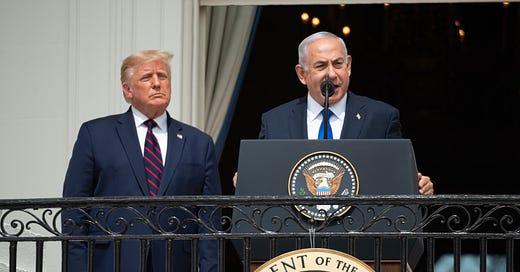Prime Minister Daylight Comes to Washington
Netanyahu has fundamentally reshaped the U.S-Israel relationship for the worse
Today Israeli Prime Minister Benjamin Netanyahu will bask in the glow of being the first foreign leader to visit the White House since President Trump’s inauguration. This visit is for him the culmination of a 15-year strategy that has fundamentally reshaped the U.S.-Israel alliance from one undergirded by bipartisan unity to one bound by his and Trump’s right-wing politics. In the process, Netanyahu has done great damage to both American and Israeli interests, splitting the Democratic Party and American Jewish community.
Before Netanyahu came (back) to office in 2009, the U.S.-Israel relationship was a bipartisan issue. Legislation in support of Israel routinely passed the Senate with overwhelming majorities. The rule of thumb agreed to by both Democrats and Republicans was that while Israel and the United States could have disagreements, it was best to keep those behind closed doors and ensure “no daylight” publicly.
Those days are long gone. Today American engagement with Israel and the Israeli-Palestinian conflict is a highly charged political issue in the United States. What happened? Having worked on issues impacting the U.S.-Israel relationship at the Pentagon, State Department, and White House throughout the Obama and Biden Administrations, I saw the transformation firsthand.
Many factors played a role. On the American left, the Obama Administration undermined trust in the relationship with its 2013 decision to open a secret backchannel with Iran without telling the Israelis. Increasing—and justified—sympathy for Palestinian rights among Democrats has also fomented friction with Israel. And as Republicans saw a gap between Democrats and Netanyahu, they went out of their way to turn Israel into a wedge issue in an attempt to peel off Jewish votes and appeal to their evangelical base. But at its core, the transformation of Israel into a partisan issue has been the result of a deliberate strategy by Benjamin Netanyahu.
Tensions dramatically escalated in 2015 when Netanyahu went behind Obama’s back to engineer, via Republicans, a visit to Washington to address Congress in condemnation of the Iran nuclear agreement—one of the President’s signature foreign policy initiatives.
But it was Netanyahu’s treatment of Joe Biden—perhaps the most pro-Israel President ever and one who referred to himself as a Zionist—that demonstrated Netanyahu’s new commitment to aligning himself with the American right.
After October 7th Biden became the first American President to visit Israel during war, travelling there only days after October 7th. He sent multiple aircraft carriers into the Middle East, announcing to Iran, Hamas, Hezbollah and others: “Don’t.” He pushed almost immediately for legislation that included $14 billion in arms for Israel. He authorized military intervention to defend Israel from two rounds of missile and drone attacks from Iran. The United States worked with Israel to hunt down the leaders of Hamas. On the key strategic issues, Joe Biden was there for Israel again and again.
As for Netanyahu, after one month of unity, he started publicly splitting with Biden on tactical issues that could have been managed in private. First he rejected the U.S. vision for post-conflict Gaza, despite the fact that his own security establishment and war cabinet were telling him that without a plan Israel would never displace Hamas. As of now there is still no credible plan, which likely means that Hamas will control Gaza for the foreseeable future.
Then came escalating tensions with Biden over Israel’s entry into Rafah, which Netanyahu presented to the Israeli public as the key to winning the war when the reality was that this was a tactical disagreement with Biden over how to conduct an operation while minimizing humanitarian damage. Perhaps most egregious was a video Netanyahu posted in June stating that the United States had been withholding many shipments of weapons and tying Israel’s hands behind its back, when only one shipment of bombs had been withheld and Biden’s overall support was unprecedented.
Compare this approach to how Netanyahu treated Trump. When Trump came out right after October 7th criticizing Israel and calling Hezbollah “very smart”, there was silence from Netanyahu. When Trump appoints a defense official with clear isolationist leanings to a position critical to Israel’s defense—silence. When Trump has pushed for ending the war and getting a ceasefire, he has never been met with the same pushback as Biden. And when Elon Musk made a Nazi salute on the day of the inauguration, Netanyahu defended him—a benefit of the doubt he would have never given to any American left-wing figure.
Netanyahu has chosen this approach because of his own domestic politics. His base and key allies such as Bezalel Smotrich and Itamar Ben-Gvir disagree with Democrats on the importance of granting rights to Palestinians, instead believing that the West Bank should be annexed to Israel. Many American conservatives agree, including Trump’s former Ambassador to Israel David Friedman and his current nominee Mike Huckabee.
Trump and Netanyahu and their bases also agree on attacking democratic institutions for personal gain, aligning themselves with the likes of Victor Orban. In Israel the strongest example of this was Netanyahu’s attempt to disempower Israel’s judiciary, which lead to mass protests for months in 2023 and warnings from Biden. Netanyahu should expect no such concerns from Trump.
Given these common threads Netanyahu’s base rewards him for his public spats with Democrats, who they see as the enemy, while approving of a close relationship with Trump, who is a fellow traveler.
What does this mean for opponents of both Trump and Netanyahu as Bibi comes to Washington? First, like Biden, Trump seems intent on sustaining the ceasefire in Gaza while pursuing normalization between Israel and Saudi Arabia—even if it means that Israel needs to make compromises on Palestine. Netanyahu cannot politically afford to pick a fight with Trump, and therefore Trump will have more leverage than Biden did in pursuing this agenda. If Trump chooses these priorities, his opponents should support him.
Second, there is a danger that Netanyahu convinces Trump that preserving the Gaza ceasefire will require concessions to the Israeli right in the West Bank and support for Israeli annexation. And certainly, Netanyahu will feel emboldened to continue his attack on Israeli governing institutions with no checks coming from the United States. Such policies must all be strongly opposed.
Finally, it is important for opponents of both leaders to remember that just as Donald Trump is not the United States, Bibi Netanyahu is not Israel. Democrats should focus on building stronger relationships with the likes of Yair Golan and Yair Lapid, who polls suggest will have much more influence when the next Israeli elections occur no later than October 2026 and most likely become part of a governing coalition that ousts Netanyahu. Their values align both with most opponents of Donald Trump and with the majority of American Jewish community.
Democrats cannot give up on the U.S.-Israel relationship. But they should give up on ever working constructively with Bibi Netanyahu.







Trump just removed our nation from the UN Human Rights Council. This is madness. We are now a fascist nation, with no real government as Congress has been sidelined thanks to the cowardice of the Republican Party. We have no regulations or recourse to combat any of the daily horrors that we are witnessing, as our democracy literally crumbles. Trump is already talking about having Congress do away with term limits. We are watching our Republic die in real time here and it is sickening.
A fugitive from the international criminal court in the White House! How appropriate!